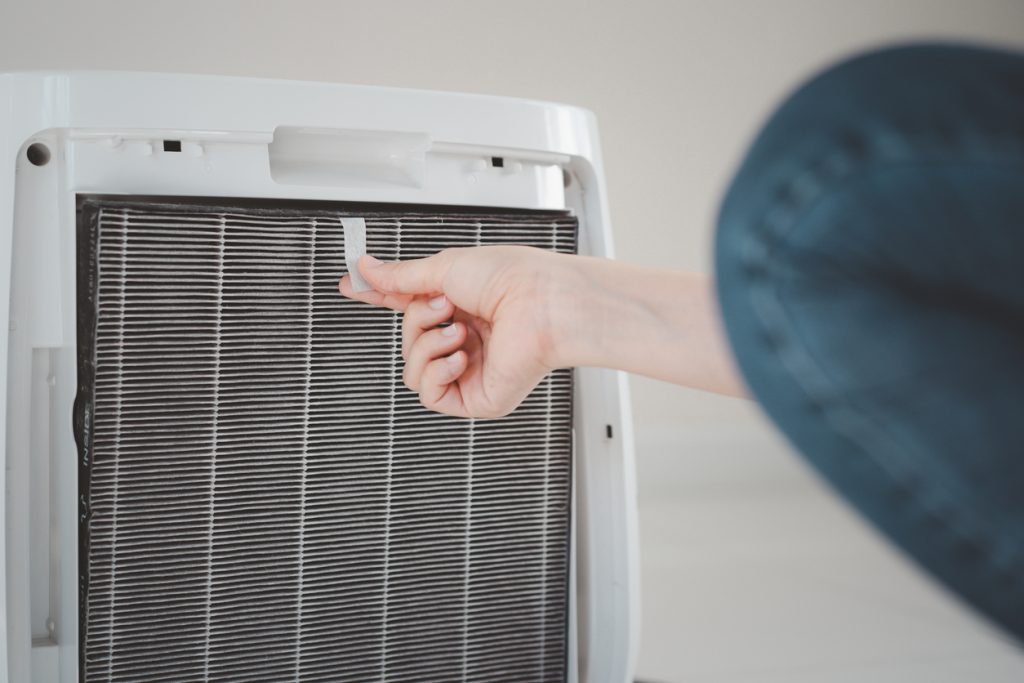 Portable room air cleaners — the quickest, most accessible option for improving indoor air quality — are simple to maintain. Most just need a filter replacement about every 6 to 12 months, depending on use and air quality. (This can vary a lot by model and environment, so it’s important to check the manufacturer’s recommendations.) There are a few factors that can shorten filter life, like:
Portable room air cleaners — the quickest, most accessible option for improving indoor air quality — are simple to maintain. Most just need a filter replacement about every 6 to 12 months, depending on use and air quality. (This can vary a lot by model and environment, so it’s important to check the manufacturer’s recommendations.) There are a few factors that can shorten filter life, like:
- Heavy use (running 24/7 or at high speed)
- Poor outdoor air quality (wildfire smoke, pollution)
- Lots of indoor pollutants (heavy pet dander, smoking, or dust)
Most consumers should expect to replace their air cleaner’s filter at least once a year, and sometimes more often.
When it comes to purchasing a replacement filter for an air cleaner, a quick internet search will produce hundreds of options. Unfortunately, it is easy to be fooled into purchasing a filter that’s not genuine. After all, a non-genuine replacement filter might look identical online, cost half the price, claim the same performance as a genuine filter, and feel like a smart buy.
But that “bargain” can end up being very costly, because using non-genuine replacement filters can create several problems:
Reduced Performance and Efficiency
- Air cleaners are designed and tested with a specific filter. A non-genuine filter may not fit properly, allowing air and pollutants like dust, pollen, smoke bacteria, viruses and more to bypass the filter.
- Non-genuine filters may use cheaper or thinner filter materials, which capture fewer particles and reduce the effectiveness of the air cleaner.
- Many non-genuine filters lack the certification or validation to guarantee they’ll perform as claimed.
Health Risks
- Poor filtration means more exposure to allergens, smoke, dust, and other pollutants, which is especially concerning for people with asthma, allergies or other respiratory conditions.
- Cheaply made, non-genuine filters may use adhesives, paper, or materials that release odors or even harmful substances into the air.
Damage to the Air Cleaner
- Improper fit can strain the fan motor, increase noise or reduce airflow.
- Clogging or shedding fibers can shorten the air cleaner’s lifespan or even void the manufacturer’s warranty.
Hidden Costs
- The hidden costs of the non-genuine filter can show up in shorter filter lifespan, more frequent replacements and a higher chance of unit failure.
- If non-genuine filters shorten the life of the unit, consumers could end up spending more on repairs or a replacement air cleaner.
Genuine vs. Non-Genuine: Learn the Signs
The savvy move isn’t chasing the cheapest filter — it’s protecting your health, your air quality, and your investment with genuine replacement air filters. Here are some ways to spot a genuine vs. a non-genuine air cleaner replacement filter:
Genuine filters:
- Come in manufacturer-branded packaging with logos, model numbers, and consistent labeling.
- Are available directly from the manufacturer, their official website, or trusted retail partners.
- May list testing standards.
- Are designed to fit properly into the air cleaner without forcing or gaps.
And here are a few red flags for non-genuine filters:
- Plain packaging or plastic wrap with no brand markings.
- Too-good-to-be-true pricing with deep discounts far below the manufacturer’s price.
- Vague or misleading claims like ‘fits most brands’ or performance claims without information about testing or certification.
- Online reviews mentioning poor fit or odors.
When purchasing replacement filters for air cleaners, our best advice is to always check the air cleaner’s manual for the correct replacement part number and buy only from trusted sources.
About AHAM Verifide®
When purchasing an air cleaner, always look for the AHAM Verifide® mark. Room air cleaners certified through the AHAM Verifide program have been rigorously tested by an independent laboratory to ensure the product will perform to the manufacturer’s claims for the suggested room size. AHAM’s standard for measuring an air cleaner’s efficacy is called the Clean Air Delivery Rate (CADR). CADR indicates the volume of filtered air an air cleaner delivers, with separate scores for tobacco smoke, pollen and dust. The higher the CADR number for each pollutant, the faster the unit filters the air. The AHAM Verifide mark can be found on product packaging.
To find AHAM Verifide® room air cleaners, use AHAM’s online searchable directory to locate the model that’s right for you.
Click Here to find a Certified Room Air Cleaner




